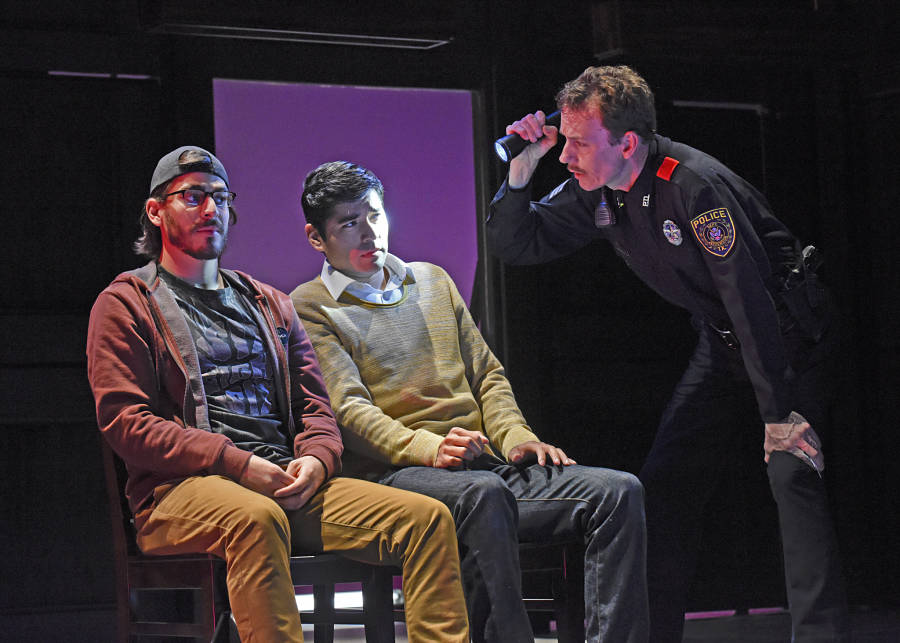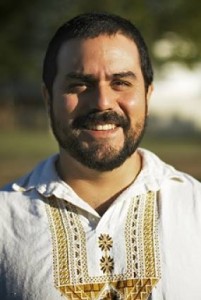DALLAS: Deferred Action, a world premiere coproduction between Dallas Theater Center and Cara Mia Theatre Co., wastes no time on polite rhetorical discussion of the major civil rights issue of our era, immigration policy, but engages at once vividly in its life-and-death struggle. As human beings hold their collective breath in crime-haunted shadows, and Congress plays expediency games to avoid creating any long-range legislation that could save lives, this new drama (running April 20–May 14) portrays the journey of a fictional child-of-immigrants “DREAMer,” Javier Mejia, from a babe in arms to a recent college valedictorian and emerging celebrity Latino activist in North Texas. Mejia becomes the face of a new America, as enshrined by opposing political factions scheming to add him to vote-grabbing arsenals.
Regional actor Ivan Jasso inhabits Javier, a bright, clean-cut idealist, with grit and character, as proud of his Latino heritage as he is committed to obtaining full U.S. citizenship. It’s easy for audiences to empathize with Javier, whether he’s schooling a rogue cop with his wild-card sidekick Robby (Arturo Soria), proposing marriage to sweetheart and fellow activist Lisa (Elizabeth Ramos), or caring for his fragile grandmother Abue (Frida Espinosa Muller). Dramatic tension explodes with clarity, unadorned elegance, and a surprising thread of humor.
Eventually Javier’s idealism fades as the play reaches a second-act crescendo, replaced with a sober, principled determination to see a major paradigm shift that will benefit many, no matter his personal sacrifice. Javier’s personal challenges interlock smoothly with a depiction of turbulent presidential election not unlike the real one we’re living through, which dropkicks the play forward at breath-catching pace. Deferred Action‘s most memorable character may be the commedia-esque persona of fulminating, anti-intellectual Tea Party presidential candidate Dale Jenkins. Michael Brusasco plays Jenkins with unabashed abandon, perfectly calibrated smarminess, and enough mangled Spanish pronunciations to send the audience into groans of mirth.
Jenkins upsets everybody’s apple cart when he announces policy shift. After a macabre dream-sequence encounter with baby Javier and his Salvadoran mother on their horrific immigrant journey north, Jenkins announces his embrace of full amnesty for immigrants and his plans to introduce legislation to make it a reality. Republicans repudiate and Democrats deride Jenkins for his apparent conversion to envisioning “a new America.” Christie Vela plays no-nonsense Democratic Senator and presidential hopeful Nancy Rodriguez with an unflappable, steely-eyed chill reminiscent of California’s longtime Senator Dianne Feinstein, providing a tough, grounded counterbalance to Jenkins’s effusive emoting and fundamentalist jargon. Rodriguez asserts that Jenkins’s policy switch is nothing but an opportunistic vote-grabbing “skydive,” all while she is held to a higher performance standard “tightrope” as a Latina woman representative who can promise nothing until she becomes president. Meanwhile, Javier, along with the thousands of real-life DREAMers he stands for, will continue to wait for promised legislative reform, in limbo until the political power brokers are good and ready.
The question remains at curtain: Will Javier sell out to Jenkins for short-term gain that could simply be reversed by a Republican Congress, or allow the status quo of suffering to continue in hopes that the pro-immigration Rodriguez takes the White House? As rousing, heart-wrenching drama punctuated with humor, pathos, and mysterious, soul-inspired revelations, Deferred Action makes a strong case for art’s capacity to move past reflecting life to inspiring its evolution—maybe even revolution?

The play was seeded when Dallas Theater artistic director Kevin Moriarty proposed partnering with Cara Mia after attending their intense, company-devised political play Crystal City 1969 in 2009. He engaged Cara Mia’s artistic director and Crystal City 1969 director David Lozano in talks about a full collaboration of both companies on an original project that Lozano would create and direct—one that would delve into hot-button political issues and allow the skills, talents, and missions of both companies to flourish. The two men chose to explore the DREAMer immigration experience. Lozano requested a cowriter, and he was joined by Lee Trull, Dallas Theater’s director of new-play development. It proved to be a complementary match.
“Kevin locked us into actor housing for three weeks, eight hours a day with two computers,” said Trull of the writing process. “We would write all day to create the story template that eventually became the play you see.” Trull found the collaboration “a unique, character-defining experience. Blending our styles of writing was a challenge at first until we were able to just hear the characters in our heads, not our separate voices.”

Added Lozano, “We had to decide at first how to dramatize the political problem at the heart of the play. It took both of us, writing, discarding, journaling, and rewriting, to arrive at its final structure and form.” They hit upon the idea of creating an alternate-reality 2016 in which a Texas Tea Party presidential candidate challenges Democrats in Congress over their foot-dragging on immigration reform by (ostensibly) campaigning to their left on the issue. The two writers invited real-life DREAMers and activists to give feedback during the play’s reading stage. “They have been with us all through the development process,” said Lozano. Indeed, the character of Javier is based on three actual activists’ experiences, including Marco Malagon and Ramiro Luna, cofounders of the North Texas Dream Team. Both have said that the play portrays the frustrations and essence of their movement with accuracy, lending palpable authenticity to its creative arc.

Collaboration with other arts organizations is a key value at Dallas Theater Center under Moriarty’s leadership. The company’s most recent coproduction was a production of All The Way with the comparably funded and recognized Alley Theatre in Houston. The collaboration with Cara Mia expands the scope and reach of possibilities. As Moriarty put it, “With this project, we are attempting to rethink how a large, heavily resourced theatre can partner with a smaller, culturally specific company. We were committed to ensuring that the cast included an equal number of actors from both acting companies, and in roles of equal size and weight. It was important to us that the piece be directed by Cara Mia’s artistic director.”
Though his company’s budget is “more than 20 times that of Cara Mia’s,” Moriarty said, “We have gained as much from working with Cara Mia as they have from collaborating with us. They inspire us. Leveraging the Cara Mia artists’ deep relationship to the Latino community has brought new audiences into the theatre, and their history of political engagement allowed us to enter into a deeply meaningful dialogue with the DREAMers, who have served as the true inspiration for this work.”
Deferred Action immerses its audience in a real-life issue that is often passed over in the media’s clamor for the sensational and celebrity-driven. More importantly, it redefines that issue in terms of the people whose lives are on the line, and on one of the main front lines of the struggle: Texas ranks second in the nation to California in numbers of undocumented citizens. Of the roughly 223,000 young people in Texas who qualify for President Obama’s DACA (Deferred Action for Childhood Arrivals), 114,540 have applied for the status. Research indicates that DACA substantially benefits those who hold the status and as a result the states where they live, with 69 percent of DACA youth interviewed saying they got a better-paying job because of the status and 9 2 percent of those who attend school saying it enabled them to pursue educational opportunities they could not otherwise.
On the other hand, Texas’s Republican-led administration is also spearheading the lawsuit, along with 25 other states, to block the Obama administration’s November 2014 DACA expansion and DAPA initiatives (Deferred Action for Parents of Americans). In February 2015, a federal district court in Texas issued an order to put these initiatives on hold. Juan Gastelum of the National Immigration Law Center in LA confirms that the Supreme Court will hand down a decision on the matter in June 2016.
Texas, in short, is in the eye of the immigration hurricane. And Deferred Action might be seen as a lightning flash from the approaching storm.


